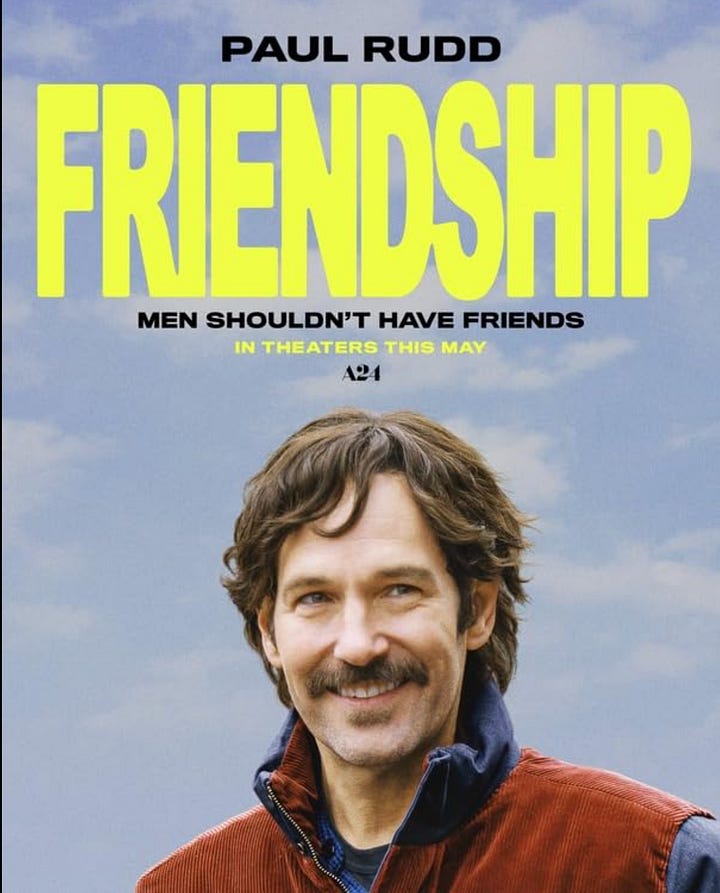Following 'Friendship,' Are Comedies About to Make a Comeback?
Producer Nick Weidenfeld weighs in on the recent void in great cinematic comedies, and discusses his approach to creative collaboration.
When Nick Weidenfeld came onto Andrew Deyoung’s new Tim Robinson-starring comedy, Friendship, as a producer, the film was quickly approaching production. It was cast, financed, and the script was in a good place. For Weidenfeld, this was unusual. Typically, he likes to develop projects from the seed of the idea. Weidenfeld began his career as Director of Programming at Adult Swim, and went on to serve a similar role for Fox’s short-lived Animation Domination High-Def (ADHD) and then at Viceland. In each job — and also as an independent producer — he worked closely with creators to help them achieve their vision to the best of their abilities. And his process bore impressive results, which include The Boondocks, Metalocalypse, Desus & Mero, and Neo Yokio.
To some extent, the job was the same on Friendship: he was being brought in to make sure everything ran smoothly and that Andrew Deyoung made the best version of his movie. But such a short runway didn’t allow for the gradual rapport-building Weidenfeld typically likes to engage in. So Weidenfeld treaded carefully when it came to giving notes, aware of the need to build trust. I was curious about how he navigated that process, and more generally how he approaches collaboration as a producer. We spoke as Friendship — which, I should say, is uproariously funny… and also a little disturbing — was gearing up for a May 23 wide release. In addition to discussing the nitty-gritty of his Friendship experience, Weidenfeld weighed in on why there’s been a shortage of great capital-C comedies in recent years and whether Friendship might provide a model for a resurgence.


To start, how did you come onto the project?
These are all my people. I've known Tim [Robinson] for a long time, and I've known Andy [Deyoung for a little while]. And I knew the finance guys, specifically a guy named Alexis Garcia. BoulderLight had already raised their hand and asked for this movie and helped shepherd it along. Tim had already signed on before that. He had a relationship to Andy and was excited. And I think the team really wanted to have a creative producer on set who had comedy experience — and who really understood the temperament that comedy people have and could see how it was operating. Everyone involved in the movie has had a lot of success, but no one on the producing side had a lot of comedy experience. So I was there to make sure Tim felt comfortable with his performance and Andy felt comfortable with what he got — and to make sure everything was running smoothly.
That being said, when you did come on, did you have any hand in creative development?
You know, on the casting, it was running. Everybody was in place. The script I think was on the longer side, and they knew that going into the shoot. Comedy should be shot long and you find it and trim it down. One of the things I was really interested in helping Andy find was the emotional core of the movie. And that was very clear as soon as they started shooting. That was the crux of any notes I had, helping find the tone. In the script, you really can hear Tim's character, Craig. It's so funny and there are so many jokes. That's what sold the movie. And then in production, you’re seeing Tim and Paul [Rudd], and hearing how Tim's delivering it. And then in post it's like, "How can we pull back a lot of what seems like the overt jokiness of it?" Paul has talked about how this movie is the funniest movie with no jokes. I think that's a funny thing to say. Obviously, no, there are real jokes. But it was about, how do we take what really worked on the page and make sure that the emotional center is really coming through? And making sure that you understand Craig. That was the main thing. What do we do to make you really understand Craig? In post, there was some moving of key scenes. Scenes that came very late in the script now are the scenes that come earliest in the movie.
Did you guys have some of those conversations before the shoot too?
Yeah. Look, Andy did such a good job in that script. A lot of it came from early reads with Tim. Because when you have someone who is not just a great comedic actor but is also a creator and who's really perfected his voice, I think a lot of those conversations came from Tim reading and then also performing and being like, "This is what's feeling natural. This is what I'm comfortable saying to have this character not just seem totally like a psycho." And I think the success of the movie is that it found that balance of him being totally insane but also totally relatable. There were drafts where Tim worked on it with Andy to go, "This is really good. But this may be going too far or leaning too hard into some kind of verbal joke when I think he would never say that after what's just happened to him." Those conversations happened during script, a little on set, and then definitely in post.
Given that you came onto the project pretty late in the game, when you got to set, how did you think about developing trust and where you would and wouldn't insert yourself?
Keep reading with a 7-day free trial
Subscribe to Nothing Bogus to keep reading this post and get 7 days of free access to the full post archives.





